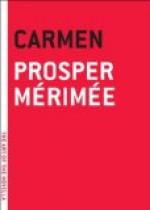The only inhabitants of this delightful dwelling visible at the moment, at all events, were an old woman, and a little girl of ten or twelve years old, both of them as black as soot, and dressed in loathsome rags. “Here’s the sole remnant of the ancient populations of Munda Boetica,” said I to myself. “O Caesar! O Sextus Pompeius, if you were to revisit this earth how astounded you would be!”
When the old woman saw my travelling companion an exclamation of surprise escaped her. “Ah! Senor Don Jose!” she cried.
Don Jose frowned and lifted his hand with a gesture of authority that forthwith silenced the old dame.
I turned to my guide and gave him to understand, by a sign that no one else perceived, that I knew all about the man in whose company I was about to spend the night. Our supper was better than I expected. On a little table, only a foot high, we were served with an old rooster, fricasseed with rice and numerous peppers, then more peppers in oil, and finally a gaspacho—a sort of salad made of peppers. These three highly spiced dishes involved our frequent recourse to a goatskin filled with Montella wine, which struck us as being delicious.
After our meal was over, I caught sight of a mandolin hanging up against the wall—in Spain you see mandolins in every corner—and I asked the little girl, who had been waiting on us, if she knew how to play it.
“No,” she replied. “But Don Jose does play well!”
“Do me the kindness to sing me something,” I said to him, “I’m passionately fond of your national music.”
“I can’t refuse to do anything for such a charming gentleman, who gives me such excellent cigars,” responded Don Jose gaily, and having made the child give him the mandolin, he sang to his own accompaniment. His voice, though rough, was pleasing, the air he sang was strange and sad. As to the words, I could not understand a single one of them.
“If I am not mistaken,” said I, “that’s not a Spanish air you have just been singing. It’s like the zorzicos I’ve heard in the Provinces,* and the words must be in the Basque language.”
* The privileged Provinces, Alava, Biscay, Guipuzcoa, and a part of Navarre, which all enjoy special fueros. The Basque language is spoken in these countries.
“Yes,” said Don Jose, with a gloomy look. He laid the mandolin down on the ground, and began staring with a peculiarly sad expression at the dying fire. His face, at once fierce and noble-looking, reminded me, as the firelight fell on it, of Milton’s Satan. Like him, perchance, my comrade was musing over the home he had forfeited, the exile he had earned, by some misdeed. I tried to revive the conversation, but so absorbed was he in melancholy thought, that he gave me no answer.
The old woman had already gone to rest in a corner of the room, behind a ragged rug hung on a rope. The little girl had followed her into this retreat, sacred to the fair sex. Then my guide rose, and suggested that I should go with him to the stable. But at the word Don Jose, waking, as it were, with a start, inquired sharply whither he was going.




